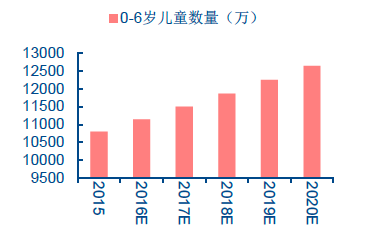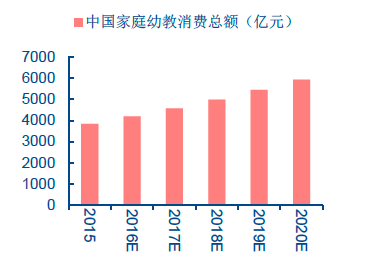Since China's economy has entered a new normal, many investors feel that in many traditional fields, the trend of investment income declines, and high-yield high-quality assets are becoming less and less, so they shout "asset shortage." A lot of idle funds, waiting to find new vents.
With the full liberalization of the "two-child" policy, a new wave of baby boomers is emerging. According to a survey of fertility willingness of 300,000 people in Sohu, 57% of families willing to have two children. According to the China Daily on the afternoon of February 28, China is studying financial incentives to encourage couples to have a second child. The preschool education industry, which is accompanied by this wave of “baby boomersâ€, is attracting capital attention with high-speed growth trends and high-profit investment return expectations, and subscribes to the education fund for early childhood education, which has become a new trend in the investment field. The preschool education field of Boxing has a very broad prospect and presents compelling features:
First, the increase in the number of school-age children, the ability and willingness of parents to increase, driving the growth of preschool consumption
In November 2015, the Fifth Plenary Session of the 18th CPC Central Committee decided to fully implement the policy of one child to have two children, and the non-individual family has also obtained the permission of two children. With the full liberalization of the two-child policy and the fact that the baby boomer population is about to enter the peak of childbirth from 1986 to 1990, a new wave of baby boomers is about to emerge.
According to the research institutes of the Peking University Population Research Institute and other relevant research institutions, the comprehensive two-child policy will increase the annual birth population to an estimated 5 million, an increase of about 30%, and the current round of birth peaks will last for about five years, and is expected to be 2020. The population of ~6 years old will exceed 125 million people , which is a very substantial increase.

At the same time, the level of education for new generation parents has been continuously improved. For the ten-year period, from the 90s, after 00, to the present 10, the gross enrollment rate of their parents’ education is 3%, 15% and 30% respectively, which means that the new generation of parents will be educated. The higher the coming. It is foreseeable that after 2020, the proportion of their parents who have received higher education will reach 45% or even 50%, and this proportion will continue to increase with the popularization of higher education.
According to a survey conducted by the China Social Science Research Center of Peking University, the higher the education of parents, the greater the expectation of their children's education, and the more economic investment in their children's education. According to the conservative budget, the consumption scale of family early childhood education is expected to reach 593.8 billion yuan in 2020 .


Second, the state encourages private funds to participate in the field of early childhood education, and the profitability of private high-quality kindergartens is strong.
In the face of the advent of "baby boomers", kindergarten construction is also imminent. It is estimated that about 291,800 kindergartens will be needed in 2020 . The state's fiscal pre-school education funding has continued to increase, and social investment is also an important source of funding for the early childhood education industry. Since 2010, the state has promulgated a number of laws and regulations to encourage social forces and private funds to participate in the field of early childhood education, with a view to promoting the development of the early childhood education industry. In 2015, the second review of the Education Law Package Amendment passed the amendment of the Education Law, removing the requirement that “any organization or individual may not hold schools and other educational institutions for profitâ€. China will recognize the legitimacy and profitability of private education from a legal perspective. In this context, private kindergartens will be further developed.
With the growth of national income, the wealthy middle-class group has grown. They have higher requirements and expectations for early childhood education, and private kindergartens provide an effective supply in this regard. Private kindergartens, especially private high-quality kindergartens, have better met the high-quality and differentiated educational needs and are increasingly attractive to parents. Parents of quality kindergartens are generally willing to pay a higher cost of money for their children's education, and will be willing to pay higher commuting costs for their children's education. From the perspective of the upgrading of the preschool education consumption of the middle-class group, the demand for quality kindergartens will continue to grow for a longer period of time; the profitability of high-quality kindergartens with stable operation will also be higher than that of stable low-end parks, and the value-added service space for quality kindergarten users will be greater. In addition, the management and teaching talents of high-quality kindergartens are scarce, and the required investment, strategic vision and management ability are higher, so they also have higher barriers to competition. Quality kindergartens have broad prospects for development and are favored by private capital.
Third, the low concentration of preschool education industry is a good time to invest
At present, the concentration of early childhood education in China is low. According to statistics, the top five private education institutions in China have a total of 2,600 kindergartens, with a market share of only 2.2%, and industry concentration is lower than K12. In addition, the products and services of enterprises in the industry are in a state of high quality content, which also provides new investors with more latecomer advantages. When the market is not saturated and capital has not yet flooded in, the early placement of the preschool education industry, especially the participation in high-quality kindergartens, is bound to yield substantial returns.
Under the situation that the global economic development is uncertain, it is especially important to grasp investment opportunities. The asset shortage in the investment field is sometimes due to lack of vision. When the opportunity comes, don't let it slip away. As the capital crocodile Soros said: "Once you find the opportunity, you have to step on both feet." Faced with the good "money " scene of the early childhood education industry , opportunities should not be missed.
Kitchen Paper Holder,Paper Roll Holder,Paper Towel Rack,Paper Towel Dispenser
Qin Jian International Limited , https://www.luanbosmart.com